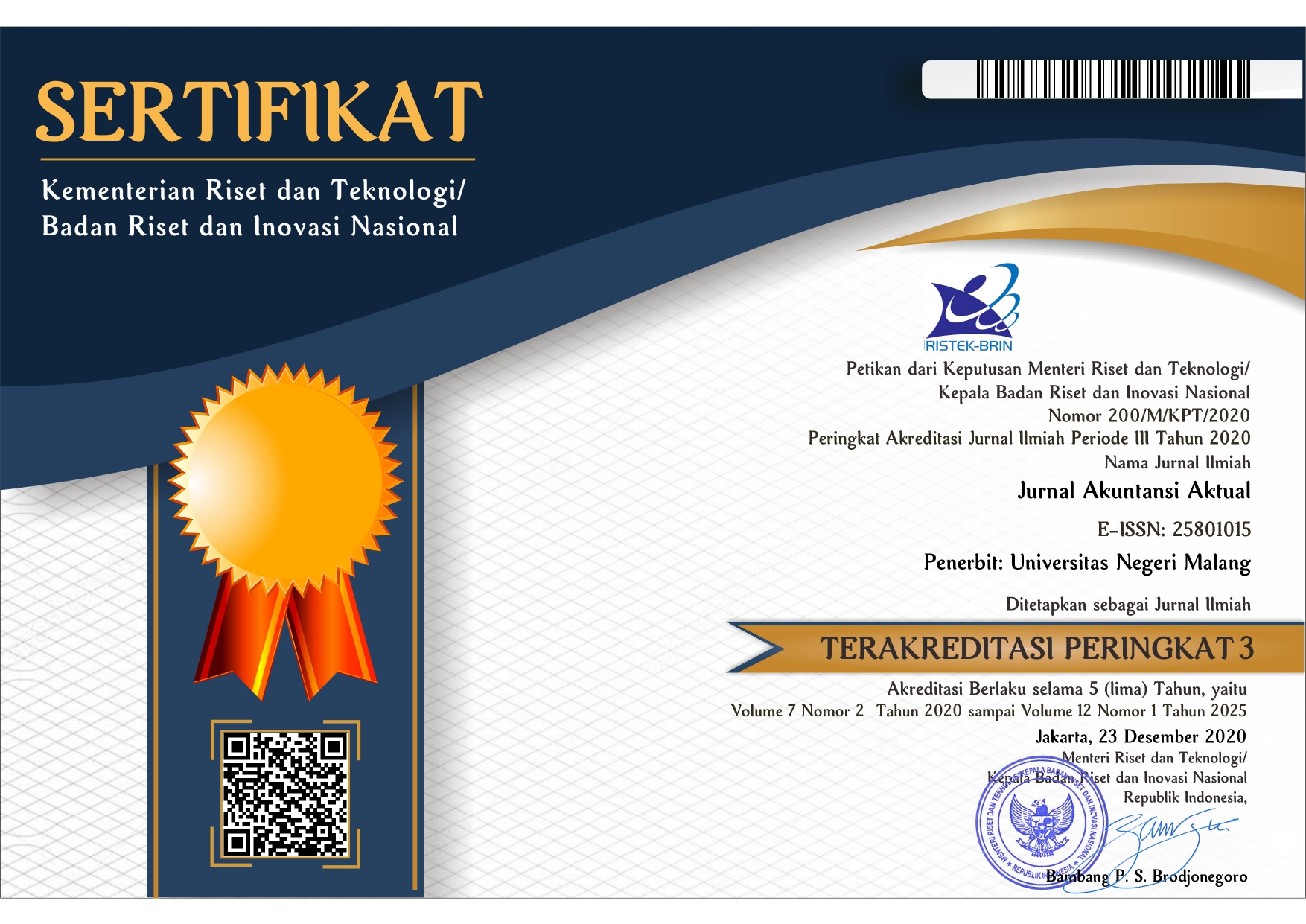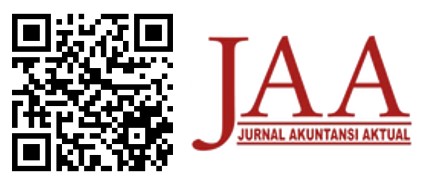Pengaruh Ukuran KAP, Spesialisasi Industri Auditor, dan Audit Capacity Stress Terhadap Manajemen Laba Melalui Manipulasi Aktivitas Riil
Abstract
Abstract: The purpose of this research is to analyze the effects of audit quality on real earnings management. Real earnings management is measured by Roychowdhury (2006) model which is divided by three proxies: sales manipulation, overproduction, and reduction of discretionary expenses. The samples of this research are 162 non-financial companies listed on the Indonesia Stock Exchange from 2007 to 2011. The result shows that firm size have no impact on real earnings management. Industry specialist auditor can minimize the sales and production manipulation, and have no impact on discretionary expenses manipulation. Audit capacity stress is found to maximize sales manipulation, and it has no impact on production and discretionary expenses manipulation.
Abstrak: Tujuan dari penelitian ini adalah untuk menganalisis pengaruh kualitas audit yang diukur dengan ukuran KAP, spesialisasi industri auditor, dan audit capacity stress terhadap manajemen laba riil. Manajemen laba riil diukur dengan model Roychowdhury (2006) yang dibagi oleh tiga proksi yaitu manipulasi penjualan, kelebihan produksi, pengurangan biaya diskresioner. Sampel penelitian ini adalah 162 perusahaan nonkeuangan yang terdaftar di Bursa Efek Indonesia periode 2007-2011. Hasil penelitian menunjukkan bahwa ukuran KAP tidak berpengaruh terhadap manajemen laba riil. Spesialis industri auditor dapat meminimalkan manipulasi penjualan dan produksi, dan tidak berpengaruh terhadap manipulasi pengeluaran diskresioner. Audit capacity stress digunakan untuk memaksimalkan manipulasi penjualan, dan tidak berdampak pada manipulasi produksi dan pengeluaran diskresioner.
Keywords
Full Text:
PDFReferences
Cohen, D. A., Dey, A., & Lys, T. Z. (2008). Real and accrual-based earnings management in the pre- and post-sarbanes-oxley periods. Accounting Review, 83(3), 757–787. https://doi.org/10.2308/accr.2008.83.3.757
Cohen, D. A., & Zarowin, P. (2010). Accrual-based and real earnings management activities around seasoned equity offerings. Journal of Accounting and Economics, 50(1), 2–19. https://doi.org/10.1016/j.jacceco.2010.01.002
Dang, L. (2004). Assessing actual audit quality. Drexel University.
Deangelo, L. E. (1981). Auditor Size ans Auditor Quality. Journal of Accounting and Economics, 3, 183–199.
Dechow, P. M., & Skinner, D. J. (2000). Earnings management: Reconciling the views of accounting academics, practitioners, and regulators. Accounting Horizons, 14(2), 235–250. https://doi.org/10.2308/acch.2000.14.2.235
Francis, J. R., Michas, P. N., & Yu, M. D. (2013). Office size of big 4 auditors and client restatements. Contemporary Accounting Research, 30(4), 1626–1661. https://doi.org/10.1111/1911-3846.12011
Hansen, S. C., Kumar, K. R., & Sullivan, M. W. (2008). Auditor Capacity Stress and Audit Quality: Market-Based Evidence from Andersen’s Indictment. Ssrn. https://doi.org/10.2139/ssrn.1092874
Januarsi, Y. (2008). Peran Auditor Spesialis Industri Dalam Mengurangi Managemen Laba Akrual Dan Managemen Laba Real Pada Perioda Sebelum Dan Setelah Keputusan Menteri Keuangan No.423/Kmk.06/2002. Simposium Nasional Akuntansi XII, (423), 1–27. Palembang.
Junius. (2012). Pengaruh Audit Capacity Stress, Pendidikan Profesi Lanjutan (PPL), Ukuran KAP, Spesialisasi, Terhadap Manajemen Laba Akrual dan Manipulasi Aktivitas Riil. Fakultas Ekonomi Universitas Indonesia, (1989), 20291942.
Katherine, S. (1989). Commentary on earnings management. Accounting Horizons, 3(4), 91. Diambil dari http://content.ebscohost.com/ContentServer.asp?T=P&P=AN&K=4816073&S=R&D=bth&EbscoContent=dGJyMNXb4kSep7c4yOvsOLCmr1GeqK5Ss6a4Ta6WxWXS&ContentCustomer=dGJyMPGusVCwrbVOuePfgeyx44Dt6fIA%0Ahttp://connection.ebscohost.com/c/articles/4816073/commentary-earnings
Krishnan, G. V. (2003). Does big 6 auditor industry expertise constrain earnings management? Accounting Horizons, 17(SUPPL.), 1–16. https://doi.org/10.2308/acch.2003.17.s-1.1
Lisic, L., Pevzner, M., & Chi, W. (2011). Is Enhanced Audit Quality Associated with Greater Real Earnings Management? Accounting Horizons. https://doi.org/10.2308/acch-50082
Paul M., H., & James M., W. (1999). A Review of the Earnings Management Literature and Its Implications for Standard Setting. Accounting horizons, 13(4), 365–383.
Ratmono, D. (2010). Manajemen Laba Riil Dan Berbasis Akrual: Dapatkah Auditor Yang Berkualitas Mendeteksinya? SNA XIII Purwokerto, 1(2005), 1–23.
Roychowdhury, S. (2006). Earnings management through real activities manipulation. Journal of Accounting and Economics, 42(3), 335–370. https://doi.org/10.1016/j.jacceco.2006.01.002
Scott, R. . . (2000). Financial Accounting Theory, Second Edition, New Jersey Prentice -Hall. Ontario: Prentice Hall Canada Inc.
Solomon, I., Shields, M. D., & Whittington, O. R. (2006). What Do Industry-Specialist Auditors Know? Journal of Accounting Research, 37(1), 191. https://doi.org/10.2307/2491403
Zang, A. Y. (2011). Evidence on the Tradeoff Between Real Manipulation and Accrual Manipulation. In SSRN Electronic Journal. https://doi.org/10.2139/ssrn.961293
DOI: http://dx.doi.org/10.17977/um004v6i22019p280
Refbacks
- There are currently no refbacks.

This work is licensed under a Creative Commons Attribution-ShareAlike 4.0 International License.
Jurnal Akuntansi Aktual is indexed by:















